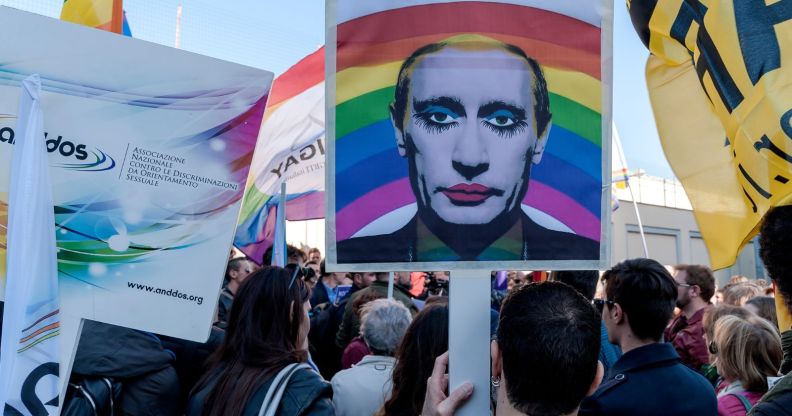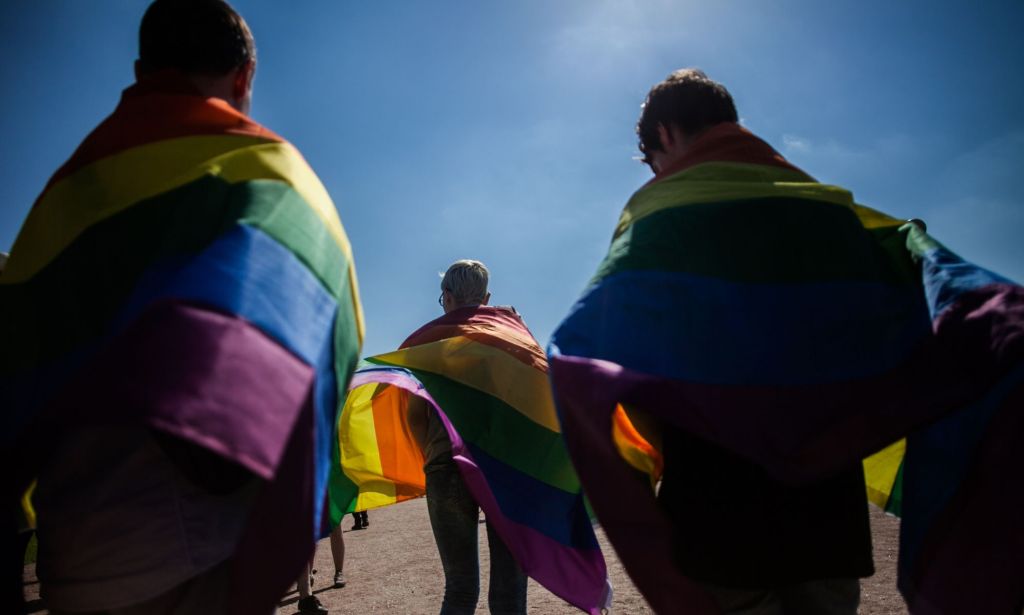Russia ordered to recognise same-sex relationships by Europe’s top court

A protestor holds up a routinely seen ‘gay clown’ poster of Vladimir Putin. (Getty)
The European Court of Human Rights has ordered Russia to recognise same-sex partnerships, but it’s unlikely Russia will implement protections for queer couples.
The ruling came in response to a years-long fight by three queer couples for legal recognition and protection after they were denied the ability to marry by Russia.
The applicants were originally turned away by registrars on the basis that the Russian Family Code defines marriage as a “voluntary marital union between a man and a woman”.
The court ruled Wednesday (18 January) that Russia had an obligation to make equivalent legal protections to marriage available to same-sex couples under Article 8 of the European Convention on Human Rights.
In the absence of marriage equality, the court found that Council of Europe member states have an obligation to put in place a “specific legal framework” for the recognition and protection of same-sex couples.
Russia ceased to be a party to the European Convention on Human Rights in September 2022 as a result of its expulsion from the Council of Europe in response to its invasion of Ukraine.
However, the court retains jurisdiction over applications lodged before that date.
Russia argued that extending marriage to same-sex couples would be “contrary to the Russian Constitution and public policy”, and that introducing any other form of legal union would be “unreasonable from a legal perspective”.

The government submitted to the court that “family in its traditional form was a fundamental value of Russian society” as it’s “intrinsically linked to the aim of preserving and developing the human race”.
However, the court ruled that these arguments weren’t enough to deny the couples their rights.
It also concluded that Russia “overstepped its margin of appreciation and has completely failed to comply with its positive obligation to secure the applicants’ right to respect for their private life and family life”.
Pierre Karleskind, vice president of the LGBTI Intergroup, said “justice is done across the Council of Europe area” because of the ruling.
“This court judgement crystalises what the LGBTIQ community has revindicated for years: that their relationships deserve as much right to legal recognition (and protection) as any other couple,” Karleskind said.
“With this in mind, we will keep advocating for the remaining EU member states to make steadfast progress at national level to respect and implement the court’s interpretation.”
Currently, there are six EU member states – Bulgaria, Latvia, Lithuania, Poland, Romania and Slovakia – that do not provide any legal framework for recognition of same-sex relationships.

Maria Walsh, who is also a vice president of the LGBTI Intergroup, called the ruling a “glorious day for our community and their restless energy”.
“This judgement can only be deemed a categorical stance on where our European continent stands,” Walsh said.
“It is high time rainbow families get the protection and recognition they deserve, and we will keep pressing to ensure that this judgement will one day be translated into a mandatory recognition of relationships in cross-border cases.”
However, it’s almost certain that Russia will not heed the court’s ruling given it has ignored previous orders on LGBTQ+ issues in the past.
In 2017, the European Court of Human Rights ruled that Russia’s ‘LGBTQ+ propaganda’ law is discriminatory, promotes homophobia and violates the European Convention on Human Rights.
The law make it a crime to distribute information about LGBTQ+ identities and people to minors.
Russia ignored the ruling and kept the law in place, even expanding its age limit in December 2022.
How did this story make you feel?

